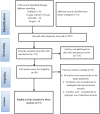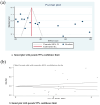Determinants of early resumption of postpartum sexual intercourse in sub-Saharan Africa: A systematic review and meta-analysis
- PMID: 39610147
- PMCID: PMC11605757
- DOI: 10.1177/17455057241302303
Determinants of early resumption of postpartum sexual intercourse in sub-Saharan Africa: A systematic review and meta-analysis
Abstract
Background: The World Health Organization recommends that all postpartum women be examined for resumed sexual activity. Despite this, postpartum sexual health education and health promotion are not adequately incorporated into current maternal healthcare systems in low- and middle-income nations. There were variations in the prevalence and variables associated with early postpartum sexual intercourse across several studies.
Objectives: The purpose of this systematic review and meta-analysis was to evaluate the pooled prevalence and associated factors for early postpartum sexual intercourse in sub-Saharan African countries.
Data sources and methods: Primary studies were identified using international databases such as Scopus, PubMed, Google Scholar, Embase, and CINAHL. The Newcastle‒Ottawa Scale quality assessment tool was used to evaluate the quality and strength of the included studies. STATA version 17 was used for the meta-analysis. The heterogeneity of the studies and publication bias was examined using I2 statistics and Egger's regression test. Subgroup analysis decreased the underlying heterogeneity based on the study years and sample sizes.
Results: Seventeen primary articles were included in the meta-analysis with 8507 study participants. The pooled prevalence of early postpartum sexual resumption in sub-Saharan Africa was 39.41% (95% CI: 31.55%-47.27%). Primiparous (OR = 3.32; 95% CI: 2.26-5.90), spontaneous vaginal delivery (OR = 5.98; 95% CI: 1.74-20.51), formula feeding (OR = 2.24; 95% CI: 1.46-3.44), family planning (OR = 2.91; 95% CI: 1.89-4.49), husband pressure (OR = 4.99; 95% CI: 1.38-18.05), have no formal education (OR = 2.36; 95% CI: 1.49-3.76), and monogamy (OR = 4.18; 95% CI: 2.27-7.69) were significantly associated with early postpartum sexual resumption.
Conclusion: Four out of 10 women had returned to sexual activity within 6 weeks of giving birth. This suggests that a large proportion of women are more vulnerable to unwanted pregnancies and sexual health problems. Sexual health education and counseling should be incorporated into standard postpartum care to increase contraceptive use and delay unplanned pregnancies.
Keywords: 6 weeks of childbirth; early sexual resumption; postpartum; sexual intercourse; sub-Saharan Africa.
Plain language summary
Early resumption of postpartum sexual intercourse in sub-Saharan AfricaThe return of sexual intercourse after delivery, as well as the use of contraceptive measures, are key parts of postpartum sexual health. Postpartum sexual health has received little attention from researchers and clinicians, with the focus remaining exclusively on postpartum contraception. Sexual health care should be integrated into primary care, and sexual health education and counseling should be offered as part of routine postpartum care. Healthcare providers place more of a focus on suggestions related to contraception because they expect that women would regain normal sexual function after giving birth and would not bother to provide counseling on postpartum sexual activity. Clinicians have paid little attention to postpartum sexual health, and the prevalence and factors associated with early postpartum sexual intercourse have been inconsistent. The goal of this study was to determine the pooled prevalence and associated factors of early resumption of postpartum sexual intercourse in sub-Saharan Africa.
Conflict of interest statement
The authors declared no potential conflicts of interest with respect to the research, authorship, and/or publication of this article.
Figures






Similar articles
-
Education for contraceptive use by women after childbirth.Cochrane Database Syst Rev. 2002;(3):CD001863. doi: 10.1002/14651858.CD001863. Cochrane Database Syst Rev. 2002. Update in: Cochrane Database Syst Rev. 2010 Jan 20;(1):CD001863. doi: 10.1002/14651858.CD001863.pub2. PMID: 12137636 Updated.
-
Postpartum intrauterine contraceptive device use and its associated factors in Ethiopia: systematic review and meta-analysis.Reprod Health. 2021 Nov 13;18(1):225. doi: 10.1186/s12978-021-01273-x. Reprod Health. 2021. PMID: 34774058 Free PMC article.
-
Education for contraceptive use by women after childbirth.Cochrane Database Syst Rev. 2012 Aug 15;(8):CD001863. doi: 10.1002/14651858.CD001863.pub3. Cochrane Database Syst Rev. 2012. Update in: Cochrane Database Syst Rev. 2015 Jul 29;(7):CD001863. doi: 10.1002/14651858.CD001863.pub4. PMID: 22895923 Updated.
-
Incentives for increasing prenatal care use by women in order to improve maternal and neonatal outcomes.Cochrane Database Syst Rev. 2015 Dec 15;2015(12):CD009916. doi: 10.1002/14651858.CD009916.pub2. Cochrane Database Syst Rev. 2015. PMID: 26671418 Free PMC article.
-
Aspirin (single dose) for perineal pain in the early postpartum period.Cochrane Database Syst Rev. 2017 Feb 9;2(2):CD012129. doi: 10.1002/14651858.CD012129.pub2. Cochrane Database Syst Rev. 2017. Update in: Cochrane Database Syst Rev. 2020 Jul 24;7:CD012129. doi: 10.1002/14651858.CD012129.pub3. PMID: 28181214 Free PMC article. Updated.
References
-
- O’Malley D, Higgins A, Smith V. Postpartum sexual health: a principle-based concept analysis. J Adv Nurs 2015; 71: 2247–2257. - PubMed
-
- Chivers ML, Pittini R, Grigoriadis S, et al.. The relationship between sexual functioning and depressive symptomatology in postpartum women: a pilot study. J Sex Med 2011; 8: 792–799. - PubMed
-
- Hipp LE, Low LK, van Anders SM. Exploring women’s postpartum sexuality: social, psychological, relational, and birth-related contextual factors. J Sex Med 2012; 9(9): 2330–2341. - PubMed
Publication types
MeSH terms
LinkOut - more resources
Full Text Sources
Medical

